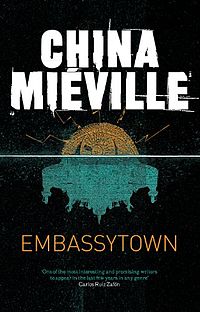Die diesjährige Fantastika Konferenz ("Global Fantastika") wurde von 4.-5. Juli 2016 in Lancaster, GB, abgehalten. Christina Scholz hielt dort einen Vortrag mit dem Titel "Ariekene Socio-Psycholinguistics and Postcolonial Awareness in China Miéville's Embassytown".
Abstract:
Weird Fiction is part of what Gary Wolfe terms ‘the post-genre fantastic’ (Luckhurst 2012:1), transcending genre boundaries as well as cultural and national spaces. It speaks to a global experience of certain spatial logics, a transformation of borders and flows (ibid), which makes it a suitable mode of writing to communicate problems and world-views in multicultural and postcolonial spaces, as writers like Nnedi Okorafor, Nalo Hopkinson, and China Miéville have demonstrated. For H.P. Lovecraft, who defined the genre, the weird is not the discovery of an aberration, which would place us in the context of law, norm and the monster. Rather, the weird is the discovery of an unhuman limit to thought, that is nevertheless foundational for thought (Thacker 2010:23). China Miéville’s novel Embassytown (2011) is an experiment in linguistics and postcolonial language politics. Humans have colonised the planet Arieka in order to harvest its biotechnology. Its (deliberately underdescribed) native inhabitants have double mouths, and their language is purely mimetic. They can only describe what they have seen or experienced, and they cannot lie. Since they don’t perceive humans as whole, sentient beings, the colonial leaders hold the monopoly on communicating with them through ‘Ambassadors’, pairs of human clones with synchronised brainwaves. With rumours of Ariekei dissent (which is complicated enough to achieve), the colonial power must find new, more effective ways to control them. The Ariekei, on the other hand, need a creative, performative language if they hope to achieve independence. Using the linguistic turn in Western philosophy as a framework, starting from describing Ariekene Language along the lines of Saussure’s classic model of the linguistic sign and ending with an explanation of the leap from simile to metaphor, Miéville explains how this can be achieved and what it means for postcolonial politics, leading us all the way from issues of otherness via a transformation of consciousness to possible worlds of intercultural communication and equality.
